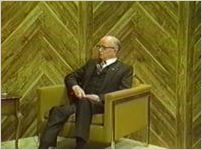- Collection:
- Georgia Political Papers and Oral History Program
- Title:
- Oral history interview with Governor Lester Maddox, 1986 April 17
- Creator:
- Maddox, Lester, 1915-2003
- Contributor to Resource:
- Steely, Mel
Fitz-Simons, Ted
University of West Georgia. Georgia Political Papers and Oral History Program - Publisher:
- Carrollton, Ga. : University of West Georgia Special Collections in association with the Digital Library of Georgia
- Date of Original:
- 1986-04-17
- Subject:
- Georgia--Politics and government--1865-1950
Georgia--Politics and government--1951-
Governors--Georgia
Legislators--Georgia
United States. Civil Rights Act of 1964
Georgia. General Assembly
Guaranteed Annual Wage--Georgia
Guaranteed Annual Wage--United States
Race relations--Georgia
Race relations--United States
National Association for the Advancement of Colored People
Primaries
Georgia--Governor--Election
Prison reformers
Segregation--Georgia
Segregation--United States
Public welfare--United States
School integration--Georgia
White supremacy movements
Civil rights movements
Pickrick Cafeteria (Atlanta, Ga.)
Georgia--Governor--Election, 1970
Georgia--Governor--Election, 1974 - People:
- Maddox, Lester, 1915-2003
Maddox, Lester, 1915-2003--Interviews
Arnall, Ellis Gibbs, 1907-1992
Busbee, George, 1927-2004
Callaway, Howard H. (Howard Hollis), 1927-2014
King, Martin Luther, Jr., 1929-1968
Carter, Jimmy, 1924-
Harris, Joe Frank
Humphrey, Hubert H. (Hubert Horatio), 1911-1978
Johnson, Lyndon B. (Lyndon Baines), 1908-1973
Lane, Mills B. (Mills Bee), 1912-1989
Maddox, Virginia Cox, 1919-1997
McGill, Ralph, 1898-1969
Truman, Harry S., 1884-1972
Vandiver, S. Ernest (Samuel Ernest), 1918-2005
Sanders, Carl, 1925-2014 - Location:
- United States, Georgia, 32.75042, -83.50018
- Medium:
- oral histories (literary works)
moving images - Type:
- MovingImage
- Format:
- video/mp4
- Description:
- Lester Maddox (1915-2003) was born to a working class family on September 30, 1915 in Atlanta. He dropped out of high school to work, and received a draft deferment during World War II due to employment in an essential industry. He opened the Pickrick Cafeteria in 1947, and became as widely known for his segregationist political commentary, as for his food. Maddox ran for office several times with no success, but became known nationally after a picture of him and supporters holding axe handles turning away black patrons ran in papers nationally in 1964. In 1966 he entered the Democratic primary for governor and defeated liberal former governor Ellis Arnall. Maddox managed a victory in a tumultuous election that ended up being decided by the overwhelmingly Democratic Georgia legislature.; Surprising to many, Maddox governed in a more moderate manner than expected and appointed more African Americans to government offices than all previous governors combined. He backed prison reform and secured more funding for the state's university system. Maddox could not serve a consecutive term as governor, so ran and won the office of lieutenant governor, where he often clashed with Governor Jimmy Carter. He went back into private business after leaving public office. Maddox died of cancer in 2003.; This interview is conducted by Dr. Mel Steely and Ted Fitz-Simons on April 17, 1986 at the University of West Georgia.; In this interview, Dr. Steely begins by asking Maddox how he came to be involved in politics, and why he continued to run even though he was defeated several times. He states that he is unafraid of controversy, which led to his polarized campaigns. He then discusses some of his strongest supporters and describes the responsibility of being in politics as making a commitment to the people as well as to making Georgia the best it could be. Dr. Steely also asks about Maddox's initial reactions to Vandiver's actions regarding the integration of the public schools of Georgia. He states that he sees himself as an underdog, which is why he chose to focus on prison reform. He states that he considers his biggest contribution to the state of Georgia was appointing African Americans to his offices, and his educational ideas. He also candidly shares his real feelings about former Presidents Nixon, Carter, and Johnson. He later refers to himself as "a little Republican, a little Democrat, and a lot of Independent" in regards to his views on the party system. He discusses his take on white supremacy versus the Civil Rights movement.
- Metadata URL:
- https://dlg.galileo.usg.edu/id:uwg_phc_maddox2
- Digital Object URL:
- https://dlg.galileo.usg.edu/uwg/phc/do:maddox2
- Language:
- eng
- Bibliographic Citation (Cite As):
- Cite as: [interview title], Georgia Political Papers and Oral History Program oral history interviews. Annie Belle Weaver Special Collections, Irvine Sullivan Ingram Library, University of West Georgia
- Extent:
- 2 videocassettes (circa 117 mins.; circa 47 mins.)
- Original Collection:
- Georgia Political Papers and Oral History Program oral history interviews. Annie Belle Weaver Special Collections, Irvine Sullivan Ingram Library, State University of West Georgia
- Contributing Institution:
- University of West Georgia. Special Collections
- Rights:
-
